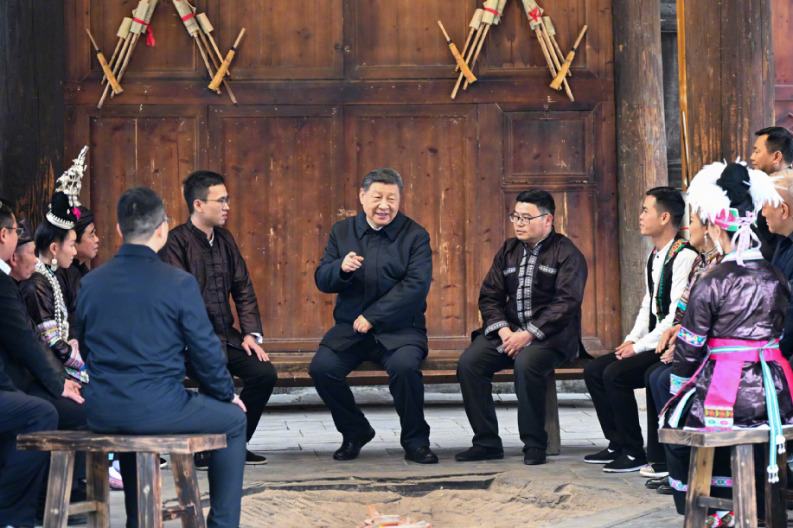Clean room
China has opportunity and capability to take leading role in the global energy transition


The global energy transition is currently at a critical stage, and if it fails, the consequences will be unbearable for all of us. Promoting clean energy and reducing dependence on fossil fuels have become an international consensus. However, the world's major economies, such as the United States and the European Union, have gradually increased trade barriers, imposing global trade sanctions through measures such as anti-dumping, countervailing duties, and carbon tariffs, leading to the significant rise of unilateralism and protectionism in global clean development. These measures have changed the situation of global energy trade and have had a profound impact on the global low-carbon transition.
The US and the EU are seeking global trade decoupling for geopolitical reasons, which is particularly evident in the renewable energy industry and has caused a huge shock to the global energy transition. Considering geopolitical and energy security factors, the US and the EU hope to strengthen their domestic industrial chains through green trade barriers. Measures, such as anti-dumping and countervailing duty investigations, and carbon footprint investigations are becoming more frequent. For example, the US launched anti-dumping and countervailing duty investigations on crystalline silicon photovoltaic cells from four Southeast Asian countries in May 2024, attempting to suppress the new energy industry of these countries and gain a more favorable competitive advantage in the market. Not only did this move undermine free trade, it also disrupted the global renewable energy supply chain and raised the cost of the energy transition. Moreover, the EU implemented its Carbon Border Adjustment Mechanism in October 2023, effectively erecting a carbon tariff barrier. This mechanism shifts the burden of emissions reduction in high-carbon industries and undermines the fairness and sustainability of the global energy transition.
The new Donald Trump administration has increased tariffs and withdrawn from multilateral agreements, worsening the situation for the global clean energy transition and slowing down the process. On the one hand, the US has waved the tariff stick and pushed for the reshoring of manufacturing, which further escalated trade frictions, disrupted the international trade order, reduced the efficiency of the division of labor based on competitive advantage in global manufacturing, and the increased costs of the energy transition. On the other hand, the US has withdrawn from international climate agreements and supported the development of fossil energy, damaging the trade environment for clean energy and casting a shadow on the future prospects of the global energy transition. This kind of rising trade protectionism gravely impacts the global energy transition.
First, it has impeded the global flow of clean energy technologies and green financing, restricting the dissemination and application of green technologies worldwide. Technical innovation and cost reduction are the key drivers of the clean energy transition. For example, the continuous decline in the costs of wind power, electric vehicles and solar energy has provided strong support for the energy transition. However, as the US and the EU raise their trade barriers, clean technology sharing faces severe challenges, and access to low-cost, large-scale clean energy technologies has become more difficult. The global progress of technological advancement is at risk of stagnation, which could, in turn, hamper the energy transition.
Second, it has led to the fragmentation and disintegration of the new energy industry, disrupting the global renewable energy supply chain and increasing the costs of the energy transition. In an attempt to seize the higher ground in the new energy industry, the US and the EU have introduced measures such as the Inflation Reduction Act, the Batteries Regulation, anti-dumping investigations, and carbon tariffs. However, these efforts to localize and regionalize the clean energy industry supply chain only lead to a fragmented and splintered global industry supply chain, reducing production efficiency and undermining the sustainable growth of the new energy industry. Moreover, the disruption of the global supply chain caused by trade protectionism has further increased production costs and undermined the efficiency of the clean energy industrial supply chain, leading to higher transition cost.
Third, it has weakened international cooperation and collaborative development, which is a key to lower the cost of green transition. The Trump administration's new policies have reversed efforts toward the energy transition and hindered the coordinated global push for low-carbon transformation. The Trump administration has threatened to increase trade barriers by imposing excessive tariffs. On the one hand, its policy emphasizes the revival of fossil fuels and the relaxation of regulations on oil and gas, which undoubtedly obstructs the growth of new energy and poses a significant shock to the energy transition worldwide. On the other hand, the US' withdrawal from the Paris Agreement has further weakened global cooperation on climate change.
Thus, it is imperative for China and the international community to implement strategies to counter the impact.
First, it is essential to enhance clean energy innovation and technological cooperation to promote the global flow of clean energy technologies and inject new momentum into the global energy transition. China will further expand its investment in green technology research and innovation and in the construction of new energy infrastructure and advance market-oriented reforms to facilitate clean development. The government should provide policy incentives to encourage domestic enterprises and research institutions to strengthen cooperation in the fields of clean energy and low-carbon technologies, drive breakthroughs in core technologies, reduce costs, and increase the added value of products. On the basis of enhancing its own technological innovation, China should actively promote transnational cooperation and technology transfer to facilitate the global flow of green technologies and provide more technical support for the global energy transition.
Second, it is important for China to consolidate its advantages in the new energy industry supply chain to promote global cooperation. Clean development is the only way to tackle climate change and China can assume a more important role in the global energy transition. Facing the fragmentation of the new energy industry chain and cost increases caused by the rise of trade protectionism, China should sharpen its own industrial chain advantages to boost win-win cooperation in the global industry chain. It should facilitate collaboration and resource sharing among multinational enterprises in the raw material and manufacturing segments, avoiding the inefficiencies and cost increases brought about by the fragmentation of the industry supply chain, and optimizing the overall efficiency of the supply chain.
Domestically, China should improve its research and development, design, and integrated manufacturing systems for the full industry supply chains of wind power and photovoltaics, further enhance the competitiveness of its industry chain and lower costs, and play a demonstrative role in the global energy transition by leveraging its industry scale and cost advantages.
Third, it is important for China to promote diversified cooperation in the global market, actively participate in international frameworks for climate change governance and low-carbon energy transition, and contribute Chinese wisdom and strength to the world's low-carbon energy transition within the framework of global response to climate change. Given the tariff barriers and high market entry thresholds imposed by the US and EU, coupled with the uncertainties brought by the Trump administration's new policies, China needs to actively explore other markets.
There are other opportunities. Under the framework of the Belt and Road Initiative, China can deepen green energy cooperation with emerging market countries and friendly neighboring nations, providing technical and financial support to help developing countries in their clean energy development and driving the global energy transition toward a more equitable and sustainable path. By participating in multilateral platforms such as the United Nations Framework Convention on Climate Change, the G20 and the BRICS cooperation mechanism, China can proactively share its experience in developing green energy, promote a global consensus on the energy transition, and coordinate actions among countries.

The author is a chair professor at the School of Management and director of the China Institute for Studies in Energy Policy at Xiamen University. The author contributed this article to China Watch, a think tank powered by China Daily. The views don't necessarily reflect those of China Daily.
Contact the editor at editor@chinawatch.cn.


































